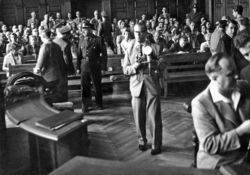Radical Evil: The 1958 Ulm Einsatzgruppe Trial and the Rediscovery of the Holocaust
The criminal prosecution of National Socialist mass crimes has generally been most associated with the Auschwitz trials that were conducted in Frankfurt beginning in 1963. The trial against former members of Einsatzgruppen that took place at the Ulm Landgericht in 1958 received little attention by comparison, even though it had been of greater political and legal-historical significance: Here, for the first time, a major criminal trial regarding the mass crimes against the Jews of Eastern Europe was thrust into the public limelight. One of the consequences of the trial was the founding of a new investigative authority, the Central Office of the State Justice Administrations for the Investigation of National Socialist Crimes, located in Ludwigsburg.
This research project undertakes a detailed breakdown of the trial, first sketching out the murders committed in Eastern Europe in light of recent research on perpetrators, investigating the careers, both before and after 1945, of those who were involved and who were later prosecuted, looks into the foundations and precursors of the Ulm trials, the Einsatzgruppe trial at the Nuremberg Military Tribunal in 1946. The study then focuses more closely on the Ulm trial of 1958, analyzes the indictment and defense, the role played by witnesses, and the reactions of the public and the media, most specifically, however, the interaction between the court and the historians who were called as expert witnesses. The verdict, in the end, spoke to the major failures of the German judiciary in its judgment of National Socialist crimes, while, however, establishing a problematic legal precedent, with perpetrators classified as mere “abettors”, all based on a fundamental historical misperception and interpretation of the Holocaust.

